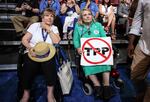
An anti-TPP delegate at the Democratic National Convention in Philadelphia.
Allison Frost / OPB
Oregon and Washington are home to a long list of large and small companies that rely on international trade — from Nike and Boeing to the huge wheat farms east of the Cascades.
So it's not surprising that Pacific Northwest members of Congress traditionally support and promote trade agreements that benefit the region's powerhouse export economy. They largely fell in line behind giving President Obama new trade authority last year, and that was just a warmup vote for the Trans-Pacific Partnership, a trade deal involving 12 Pacific Rim countries.
But then came the unlikely rise of Donald Trump and Bernie Sanders.
Trump broke with Republican orthodoxy in attacking trade deals from the North American Free Trade Agreement to the TPP. Sanders attacked Hillary Clinton's support of trade deals, and his opposition to the TPP became one of his most popular issues.
Pressure from Sanders led Clinton to oppose the final TPP deal. Congressional leaders now say they won't even bring the Trans-Pacific Partnership up for a vote — at least not until after the November election.
Oregon Sen. Ron Wyden is the top Democrat on the Senate Finance Committee and has long supported trade deals, saying they are good for his state. He's worked with Obama and Republican leaders to make them more politically palatable.
“I said we’ve got to lay out a very different game plan, and the theme of it is 'trade done right,'" Wyden said.
The trade deal shaped by Wyden required countries signing on to meet higher labor and environmental standards. But critics say the TPP remains a sop to multinational corporations that would allow them to run roughshod over local regulations.
Tim Duy, an economist at the University of Oregon, says there is little doubt that some parts of the United States were slammed economically as many companies out-sourced production to China and other countries. But much of it would have happened without any trade deals, he says.
“Underlying it all is the technological change issues," he said. "That’s happening regardless of the trade policies.”
Wyden says he doesn’t know if Republican leaders will attempt to bring up trade legislation in the lame-duck session after the November election. If the TPP dies, Rep. Kurt Schrader, another Oregon Democrat, says China could step in and organize its own international trade confederation — leaving U.S. exporters out in the cold and hitting the Northwest especially hard.
"We start to lose jobs," he said. "The standards will be set by other countries. China will lowball us in the wage area. We just increased our minimum wage significantly over the next few years. We'll become completely, totally uncompetitive."
Not every member of Congress in the Northwest sees it the same way. Oregon Democrat Jeff Merkley was the only member of the Senate to endorse Sanders for president and says that even if Oregon does well in international trade, that’s not enough.
“I love our companies that are headquartered in Oregon, and they are operating within the current framework," he said. "But the current framework is hurting American workers.”
Like virtually everyone in the trade debate, Merkley says he supports fair trade. But agreeing on how to define what is fair is even more difficult this election year.